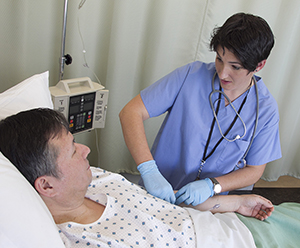The first few hours
You’ll be closely monitored in the post anesthesia care unit (PACU) or the intensive care unit (ICU) for the first few hours after surgery. Here, you will wake up from the anesthesia. Try not to move your head or neck, the area where the incisions were made. It’s normal to feel some pain near the incision. You'll get pain medicine as needed. You’ll also have an IV (intravenous) to give you fluids and medicine. Your blood pressure, breathing, and other vital signs will be closely watched. Your loved ones may be able to visit you soon. The medical staff will watch your mental state closely to make sure there are no changes.
As you regain strength
If your blood pressure, breathing, and heart rate are normal, you will be moved to a regular room. If your doctor has concerns about your blood pressure and heart rate being too low or too high, you may need to spend some more time in the ICU. Expect to be up and walking within 24 hours if you have no problems. If a drain was inserted into the wound area, the doctor or a nurse will remove it the day after surgery. Most people spend at least 1 night in the hospital. You can go home when your doctor says it’s OK. Have a trusted adult drive you home.


